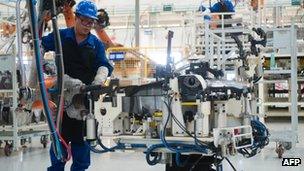Obama and Romney spar over China trade practices
- Published
President Barack Obama tells supporters in Cincinnati, Ohio, he will "walk the walk" with China and slams his rival Mitt Romney for sending jobs overseas.
US President Barack Obama and his Republican challenger Mitt Romney have been sparring on the campaign trail over trade relations with China.
Mr Obama filed a World Trade Organization (WTO) complaint against China on Monday, accusing it of illegally subsidising car exports.
But Mr Romney said the president had lost credibility on the issue of standing up to Beijing.
With November's elections looming, Mr Obama's move is seen as political.
Mr Obama discussed the WTO action against China on Monday as he visited the US state of Ohio, which has more than 50,000 workers employed in the car industry.
'Harming workers'
Ohio is a critical state in the forthcoming elections, with success there seen as crucial to becoming president.
Speaking to supporters in Cincinnati, Mr Obama said: "Today, my administration is launching new action against China - this one against illegal subsidies that encourage companies to ship auto-parts manufacturing jobs overseas.
"Those subsidies directly harm working men and women on the assembly line in Ohio and Michigan and across the Midwest. It's not right; it's against the rules; and we will not let it stand."
He also accused his rival, Mr Romney, of sending jobs overseas while he was at the helm of private equity firm Bain Capital.
But Mr Romney hit back at Mr Obama, saying the president had not done enough to restrain China.
"Campaign-season trade cases may sound good on the stump, but it is too little, too late for American businesses and middle-class families," he said in a statement. "President Obama's credibility on this issue has long since vanished."
Mr Romney has repeatedly accused the president of being too soft on China.
Almost immediately after President Obama's plans were revealed, China requested formal negotiations with the US over extra duties imposed on Chinese tyre imports.
US 'wrongdoing'
Earlier this year, a new bill gave the US authority to levy tariffs on cheap Chinese imports and backdate them to 2006.

China is America's most important trading partner and has the largest car market in the world
"Through consultation within the WTO trade dispute settlement mechanism, the Chinese side hopes the US can correct its wrongdoing and properly deal with concerns from China," said Shen Danyang, a spokesman for China's Ministry of Commerce.
In the latest wrangle, the Obama administration claims that China's "illegal subsidies" in the car sector totalled $1bn (£600m) between 2009-11.
The US president believes that the subsidies encourage America to outsource car and car-parts production to China, with these products then exported into the US or other nations.
"Export subsidies are prohibited under WTO rules because they are unfair and severely distort international trade," said US trade representative Ron Kirk in a statement.
Ford to sell luxury Lincoln in China
China pledged to wipe out export subsidies when it joined the WTO in 2001.
The Obama administration has already filed two other WTO complaints against China this year. The first accused Beijing of restricting exports of so-called rare earth metals, used to make high-tech devices.
The US argued this has distorted the world economy by making it more expensive to make such goods outside China.
The second case accused Beijing of imposing anti-dumping duties on US cars exported to China, making them more expensive to buy, in a bid to protect local manufacturers.
Anti-dumping duties are used if a country thinks an item is priced lower than it costs to produce.